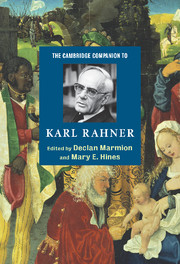Book contents
- Frontmatter
- Introduction
- Part I Spiritual, Philosophical, and Theological Roots
- Part II Theological Investigations
- Part III Conversations Ongoing
- 12 Rahner amid modernity and post-modernity
- 13 Rahner’s reception in twentieth century Protestant theology
- 14 Karl Rahner
- 15 Rahner and religious diversity
- 16 Political and liberation theologies
- 17 Feminist theologies
- Part IV Retrospect and Prospect
- Appendix
- Index
12 - Rahner amid modernity and post-modernity
from Part III - Conversations Ongoing
Published online by Cambridge University Press: 28 May 2006
- Frontmatter
- Introduction
- Part I Spiritual, Philosophical, and Theological Roots
- Part II Theological Investigations
- Part III Conversations Ongoing
- 12 Rahner amid modernity and post-modernity
- 13 Rahner’s reception in twentieth century Protestant theology
- 14 Karl Rahner
- 15 Rahner and religious diversity
- 16 Political and liberation theologies
- 17 Feminist theologies
- Part IV Retrospect and Prospect
- Appendix
- Index
Summary
RAHNER AS A MODERN THEOLOGIAN
Rahner has “modern” credentials. Following Maréchal, he seeks to overcome the constraints which the Enlightenment project placed upon knowledge. The former ontological critique was displaced by the transcendental critique of the Enlightenment, and it was no longer possible to give an account of exteriority other than in terms of the subject. As Maréchal notes, “the ancient critique posits the ontological object, which includes the transcendental subject; whereas the modern critique relates to the transcendental subject, who posits the ontological object.” If, in modernity, the concern was the constituting role of the epistemic subject in knowing and the concomitant problem of the ontological status of the object, the problem in post-modernity is the displacement of the stable subject, now viewed not simply as constituting and constructing but also as constituted and constructed, and the concomitant return of the object whose exteriority disturbs and disrupts subjective frameworks and horizons. Said otherwise, the post-modern concern is for fragmented subjectivity or interiority and the return of objectivity or exteriority, and the challenge which these present to enlightened transcendentalism.
Now, Rahner himself admits “the principle that every philosophy, i.e. every genuine metaphysics worthy of the name must proceed along the lines of transcendental philosophy, or else it is not philosophy in this authentic sense at all.” For “transcendental,” the “phenomenological” – which can be viewed as a continuation of the project of modernity – can also be imputed.
- Type
- Chapter
- Information
- The Cambridge Companion to Karl Rahner , pp. 195 - 210Publisher: Cambridge University PressPrint publication year: 2005
- 1
- Cited by

